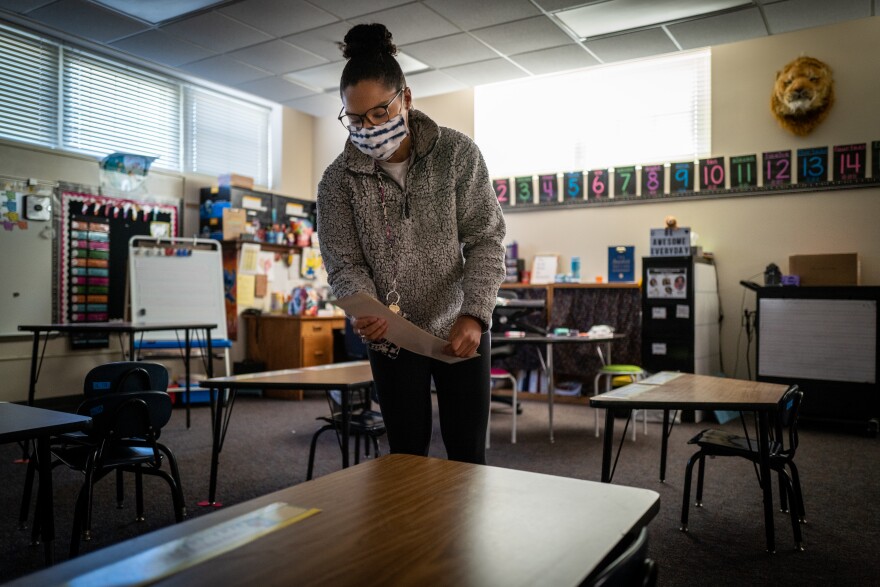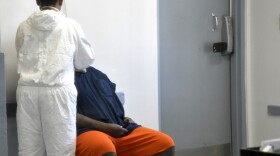For so many teachers right now, trying to get the COVID-19 vaccine can feel like a distilled version of everything that’s been so stressful and challenging about the last 10 months: Nothing’s working the way it’s supposed to. No one seems to be able to figure out what’s going on. And you’re basically on your own.
That feels especially true for those who are teaching in person. Last week, one of Mariam Mangan’s high school English students told her: she’d tested positive for COVID. Mangan, who teaches in Fowlerville, a school district in Livingston County, then got a call from the parents of another student: another positive test.
Then came word from her close friend, who also teaches in Mangan’s building, that they’d tested positive as well.
It felt like the walls were closing in.
“So, last week was stressful,” Mangan sighs. “Because I really feel like, it’s everywhere. It’s everywhere.”
Back in August, Mangan says, the parents in her district were adamant about going back in person. The district held meetings over the summer about it. Tensions ran high, she recalls.
“I spoke out a handful of times, along with many of my colleagues, against returning to face-to-face. I just didn't feel like it was safe. I was very unsettled by all of it. I have contemplated quitting my job.”
But Mangan’s been teaching for 20 years. She loves it. So, for now, she’s staying, and teaching “hybrid” classes: A handful of kids log in online from home, but most of the students are there with her, in the classroom.
She teaches (or at least, tries to teach) both groups of students, simultaneously. But inevitably, her after-school hours are spent answering emails from the online students, while also checking in with her three grade-school children who’ve been learning remotely while her husband works from home.
One of her classes, her largest, has 31 sophomores, all in the same room.
“You know when you're fighting like a sickness or something?” Mangan asks. “Like, you're fighting a cold or the flu – you know how it just takes everything in you? That's how I kind of felt in the physical environment. I felt on guard and paranoid.”

She’s doing what she can, she says. She’s moved her desk to the back of the room, closer to the windows. She asks students and colleagues who get too close to give her some space, even though it makes her feel rude or standoffish.
Getting vaccinated feels like one more thing that’s outside her control. With limited supplies, many health departments are prioritizing vaccinations for those 65 and older. Hospitals and clinics have had to reschedule appointments after receiving smaller shipments than expected. The entire state is receiving about 60,000 doses a week, Governor Gretchen Whitmer said in a press conference Friday, far fewer than what’s needed.
“Eligible frontline essential workers will be notified by their employers about vaccine clinic dates and locations,” the state’s vaccination website reads. “These workers include school and child care staff, frontline responders, and corrections staff.”
But many teachers’ employers don’t have much information for them.
“We just don't really have a timeline,” Mangan says. “They're looking at some time in maybe February. But I don't know if that's going to even happen.”
Then Mangan hears about friends, teaching in other districts, who have been able to easily get a shot. In some places, health departments are prioritizing vaccinations for teachers in the handful of districts that are teaching in person. But Mangan just heard about a friend who was able to get vaccinated, even though she’s teaching remotely.
“That was just sort of like, whoa,” she laughs wryly.
Meanwhile, Mangan’s checking in with her younger sister, Zeinab Chami, who also teaches high school English.
“I actually warned her about becoming a teacher,” Mangan jokes. “I said, ‘You know, it's not as great as you think.’”
Chami teaches at Dearborn Public Schools, which is still remote at this point. But she doesn’t have much clarity about getting the vaccine, either.
“We’ve essentially been told by our union to try to get it on our own,” she says. Her teacher’s union has been emailing staff updates as they get them.
“The Wayne County Health [Department] is considered our primary resource for the vaccine, but as of today they are still completing the 1A group (medical personnel,)” an email from January 20 reads. “If you are able to volunteer for a full day at the Wayne County Health Dept., you are eligible to receive a vaccine that day.”
“Also please continue to reach out to your primary physician or pharmacy to be placed on a list for the vaccine. The distribution of the vaccine has had some issues, so we are encouraging members to use all resources to obtain the vaccine. The Union and DPS will continue to work on this vaccine supply issue.”
Meanwhile, the clock is ticking. Chami expects her district will go back to in-person by March 1, per Governor Whitmer’s urging. But Chami has no idea whether she’ll have gotten her shots by then.
“I'm resigned to the idea of going in before I’m vaccinated. Just because ... I guess it's best to prepare for the worst case scenario, right?” she laughs, then sighs.
The sisters have put their efforts into getting their parents, both senior citizens, appointments for the vaccine. Their mother has an autoimmune disease, Chami says, and their father’s had cancer. Their mom’s primary care physician is part of the Beaumont Health system, which made getting her an appointment a little easier.
But their father’s doctor isn’t affiliated with a major health system. So far, health systems have received the bulk of the vaccines that don't go to long-term care centers or local health departments.
It took hours of jockeying online, making phone calls, and putting out calls for help on social media, Chami says.
“A friend of a friend reached out ... saying ‘Register here, register there.’ So we registered him through three health care systems in the area.” The teacher’s union suggested trying Meijer pharmacies, which responded to her pretty quickly, Chami says. Both parents now have appointments, which has been a relief. But the process of getting there was another reminder of how unfair and chaotic the system can feel.
“My parents native language isn’t English,” she says. “How do senior citizens navigate this technological morass? Because I was online all day, scrambling. So how do people without someone in their lives to help them, navigate this? It’s really hard to think about, honestly.”
Teachers are pretty passionate people, Chami says. And back in the spring, when the pandemic started, this confusion and chaos surrounding vaccinations would have made them angrier. They’d have pushed back more.
But now, ten months in and with so much uncertainty still ahead, they’re worn out.
“We don't even have the energy to be angry anymore,” Chami says. “We’re just accepting things.”
So for now, Chami will keep teaching online, waiting to see what her job will look like by March.
Mangan will keep going to school in person, so long as the outbreaks don’t force a temporary shutdown. Neither knows how, or when, they’ll be able to get vaccinated.








